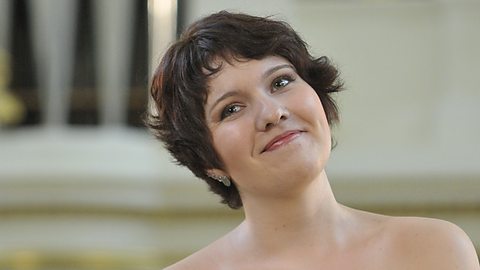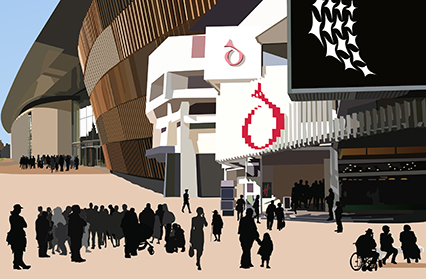As the Cardiff Singer of the World crescendos towards its conclusion, and with the Song Prize Final taking place this evening, Cath Barton was at St David’s Hall last night, June 18, to hear the Main Prize Concert 4. In her review, she reports on the winner, and the wild card from the competition as a whole who will be joining three other singers there for the Main Prize Final on Sunday evening.
When all the trappings are set aside, the lights, the cameras, the mighty machine which runs the BBC Cardiff Singer of the World competition, what is it about, a person standing on stage singing to thousands of people in a concert hall and beyond, on radio, TV and, for the first time this year, streamed on-line around the world? It is diversion, entertainment. But when you hear a very special singer, it is something more. I am reminded of the quote from the French novelist Flaubert, who in his novel Madame Bovary said:
‘Language is a cracked kettle on which we beat out tunes for bears to dance to, while all the time we long to move the stars to pity.’
And if it is so with words, the more so with words and music together. What we strive for is an emotional connection, something profound. It is the singer who can make that connection consistently who, to my mind, should win this competition.
The Main Prize Concert 4 was opened by Regula Mühlemann from Switzerland, not a mezzo as billed in the programme but, as Tim Rhys-Evans said in his introduction, a very high soprano. Her voice is light and bright, her vocal production agile and her acting easy and convincing. Her choices of soubrette arias -Adele’s laughing song from Strauss’s Die Fledermaus and Norina’s ‘Quel guardo il cavaliere…So anch’io la virtù magica’ from Donizetti’s Don Pasquale – were intelligent ones, showing off her agile coloratura. However she does not have the grit which will make the oyster, and while she demonstrated that she could make a two octave leap in Mozart’s concert aria ‘Vorrei spiegarvi, oh Dio!’, she did not show a real depth in her voice to underpin the delights of her high singing.
The third singer from the USA to be heard in the competition, Ryan Speedo Green, was next on stage. His biography tells us that he has sung the role of Don Basilio in Rossini’s The Barber of Seville with the Weiner Staatsoper ensemble, so I was surprised that he did not look more comfortable in ‘La calunnia’, his opener. His face was enlivened briefly by a wicked little smile, but I felt his energy was bottled up. He has a fine vocal instrument, rich and smooth, but he is let down by his stage presence, with a distracting tendency to bounce on his heels in the Rossini and also in Colline’s aria from Puccini’s La bohème, as if he had been instructed not to move but really wanted to do so. In between these two he sang ‘The people that walked in darkness’ from Handel’s Messiah, a curious choice. More successful was Osmin’s patter song from Mozart’s Die Entführung aus dem Serail, which he tackled with enthusiasm.

Nadine Koutcher from Belarus is also a coloratura soprano, but a singer who has developed strength and agility throughout her range. From the moment she started to sing she was spellbinding. Her voice is that desirable and rare thing, completely free. There are no obstructions, so she is able to open out from a pianissimo sound and bring the volume back down again with extraordinary control. Donald Maxwell, in his pre-performance talk, had wondered whether opening with ‘Depuis le jour’ from Charpentier’s Louise might be, as he put it, a banana-skin moment. Far from it. She sang with poise and control. The highlight of her programme was ‘Les oiseaux dans la charmille’ from Offenbach’s The Tales of Hoffmann. Beginning with a fluttering of her eye-lashes, she sang the song of Olympia, the mechanical doll, to perfection.
She held the audience in thrall, using the silence as well as the sound, as in holding the pauses after her clockwork had run down and before conductor Martyn Brabbins tweaked her hair to set her off again. She demonstrated the assurance of her bel canto singing in Elvira’s wedding aria from Bellini’s I puritani and concluded with a compelling performance in Russian of ‘Oh, do not weep, my Paolo’ from Rachmaninov’s Francesca da Rimini.
The two remaining two contestants must have been glad of the intervening interval, as Koutcher was the proverbial hard act to follow. Insu Hwang, the South Korean baritone, was unfazed. Considering that he was playing a character meant to be about three times his age, he conveyed the essential warmth and humanity of Hans Sachs in ‘Was Duftet doch des Flieder’ from Wagner’s Die Meistersinger von Nürnberg remarkably successfully. He also showed himself at ease with the long legato lines of Alidoro’s aria ‘Là del ciel nell-arcano profondo’ from Rossini’s La Cenerentola and conveyed something of the jealousy of the cuckolded Ford in ‘È sogno? O realtà’ from Verdi’s Falstaff. Hwang has stage presence and a sumptuous baritone instrument.
Last but not least was Canadian dramatic soprano Aviva Fortunata. She has a rich and round tone, carrying easily over the orchestra but never heavy. Her programme could have had more variety, but she carried off Elsa’s dream aria from Wagner’s Lohengrin with aplomb and showed a sound technique in Anna’s aria ‘Ah! Che invan su questo ciglio’ from Rossini’s little known Maometto II. ‘Chi il bel sogno di Doretta’ from Puccini’s La rondine, with its beautiful soaring melody, was a lovely aria on which to end her programme, and she met its challenges well. She could benefit from working on the variety of her facial expressions to match her range of vocal expression.
All the singers had fine qualities, but there was no doubt in the hall about who the winner of this round of the competition would be. Nadine Koutcher goes through to Sunday’s final, alongside the winners of rounds 1, 2 and 3 respectively, Oleksiy Palchykov, Lauren Michelle and Amartuvshin Enkhbat. The wild card for the fifth place in the final was given to the South Korean bass, Jongmin Park.
A word of appreciation must go to the orchestra of Welsh National Opera, who gave the singers the support they needed throughout, their conductor Martyn Brabbins being sensitive to the singers without holding back on the volume when the music demanded it.
Cardiff Singer of the World Main Prize Concert 4
Regula Mühlemann (soprano, 29, Switzerland)
Ryan Speedo Green (bass-baritone, 29, USA)
Nadine Koutcher (soprano, 32, Belarus)
Insu Hwang (baritone, 32, South Korea)
Aviva Fortunata (soprano, 27, Canada)
Welsh National Opera Orchestra, conducted by Martyn Brabbins
Illustration by Dean Lewis
Cath Barton won the New Welsh Writing AmeriCymru Prize for the Novella with The Plankton Collector, which is published by New Welsh Review under their Rarebyte imprint. Her second novella, In the Sweep of the Bay, will be published by Louise Walters Books in September 2020, and in early 2021 Retreat West Books will publish her collection of short stories inspired by the work of the Flemish artist Hieronymus Bosch.



 Enjoyed this article? Support our writers directly by buying them a coffee and clicking this link.
Enjoyed this article? Support our writers directly by buying them a coffee and clicking this link.








